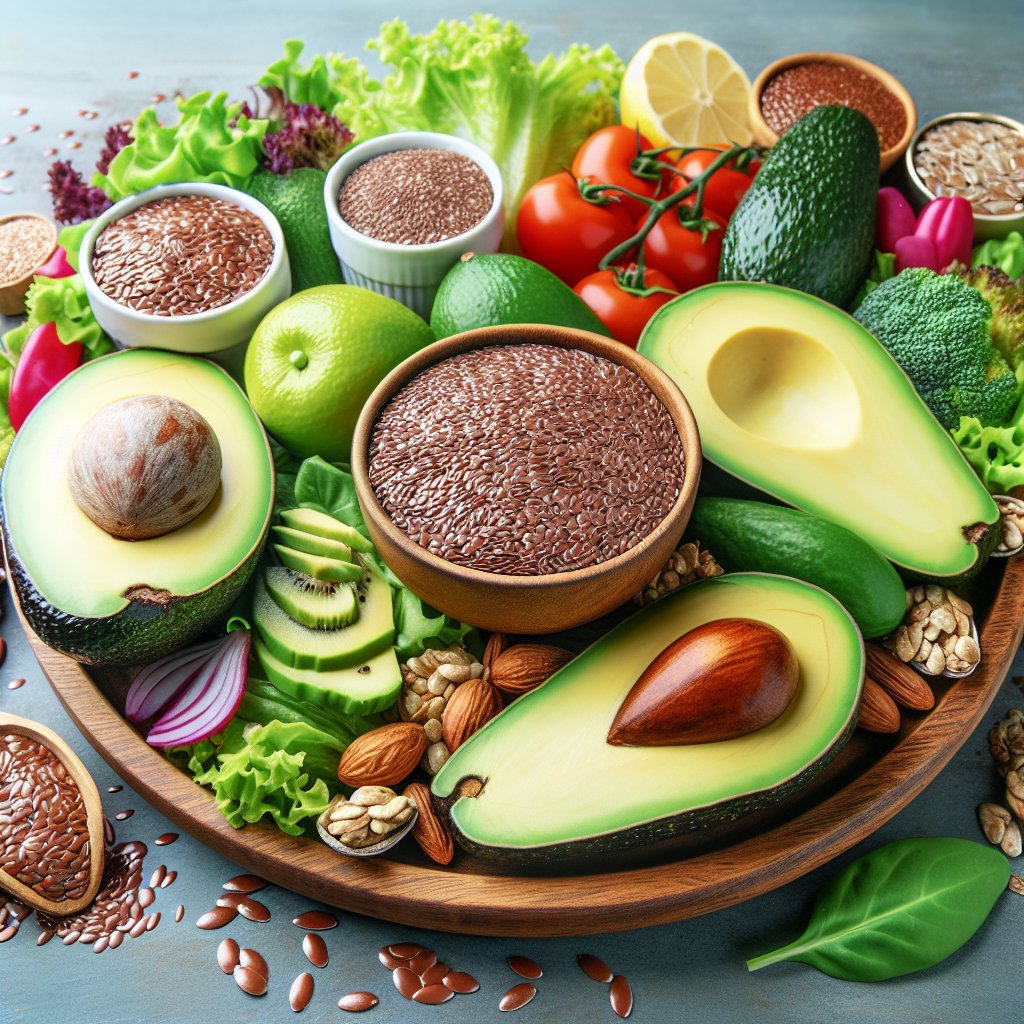Unveiling the Secret: How Flaxseed Supercharges Your Keto Diet for Optimal Health and Weight Loss
Unveiling the Secret: How Flaxseed Supercharges Your Keto Diet for Optimal Health and Weight Loss
Welcome to our in-depth guide to the incredible benefits of flaxseed and how it can supercharge your keto journey. Flaxseed has been enjoying a surge in popularity within the keto community, and for good reason. Not only is it a versatile ingredient, but flaxseed also offers a wide range of health benefits, making it a valuable addition to your low-carb, high-fat lifestyle.
So, what’s all the hype about flaxseed? Let’s delve into the science and uncover the secrets behind its popularity in the keto diet.
The Popularity of Flaxseed in the Keto Diet
Flaxseed has become a beloved superfood in the keto community for several reasons. First and foremost, flaxseed is an excellent source of fiber and healthy fats, two essential components of a successful ketogenic diet. According to a study published in the *Journal of Food Science and Technology*, flaxseed is rich in alpha-linolenic acid (ALA), a type of omega-3 fatty acid that is beneficial for heart health and overall wellness. The high fiber content of flaxseed also supports digestive health, which can be particularly beneficial when transitioning to a low-carb eating plan.
Furthermore, the versatility of flaxseed makes it a valuable ingredient in keto-friendly cooking and baking. Whether used as a flour substitute in low-carb recipes or added to smoothies for an extra nutritional boost, flaxseed can elevate the taste and nutritional profile of a wide range of dishes.
The Benefits of Flaxseed for the Keto Diet
When it comes to the benefits of incorporating flaxseed into your keto lifestyle, the list is impressively extensive. To begin with, the high fiber content of flaxseed can aid in promoting feelings of fullness and satiety, which can be particularly advantageous for those striving to manage their weight while following a ketogenic eating plan. Research published in the *Nutrition Journal* suggests that flaxseed supplementation may lead to reduced hunger and overall calorie intake, supporting weight management efforts.
Furthermore, the omega-3 fatty acids in flaxseed have been linked to various health benefits, including reduced inflammation and improved heart health. As emphasized in a study in the *European Journal of Clinical Nutrition*, the anti-inflammatory properties of flaxseed may offer protective effects against chronic diseases, aligning perfectly with the overall goal of the ketogenic diet to promote holistic well-being.
With the scientific evidence backing its popularity and myriad benefits, it’s no surprise that flaxseed has become a staple in the keto community. In the following sections, we’ll explore the ways in which flaxseed can supercharge your keto diet for optimal health and weight loss, providing practical tips and recipes to help you incorporate this powerhouse ingredient into your daily meals.

Nutritional Value of Flaxseed
Flaxseed, also known as linseed, has been revered for its impressive nutrient profile for centuries. It’s a versatile and valuable addition to any keto diet, offering a range of health benefits. Let’s take a closer look at the nutritional content of flaxseed and how it perfectly aligns with the principles of a ketogenic lifestyle.
Rich in Healthy Fats
One of the standout characteristics of flaxseed is its high content of healthy fats, particularly alpha-linolenic acid (ALA), an essential omega-3 fatty acid. Research has shown that including omega-3 fatty acids in the diet can have a positive impact on cardiovascular health and aid in reducing inflammation. For individuals following a keto diet, the inclusion of healthy fats is crucial for maintaining ketosis and supporting overall well-being.
Fiber Powerhouse
Flaxseed is loaded with dietary fiber, with just a small serving providing a significant portion of your daily recommended intake. This high fiber content not only supports digestive health but also helps in promoting feelings of fullness and satiety, which can be particularly beneficial for individuals aiming to manage their weight as part of their keto journey.
Essential Micronutrients
From a micronutrient perspective, flaxseed is an excellent source of a variety of essential nutrients, including thiamine, magnesium, and phosphorus. These nutrients play crucial roles in metabolism, energy production, and bone health, making flaxseed an invaluable addition to a well-rounded keto diet.
Protein Prowess
For those striving to meet their protein requirements while following a ketogenic diet, flaxseed is a fantastic plant-based source of this macronutrient. Incorporating flaxseed into your meals or snacks can contribute to the overall protein intake, supporting muscle maintenance and repair.
With its impressive array of nutrients, flaxseed undoubtedly earns its status as a superfood in the realm of ketogenic nutrition.
Stay tuned for the next section where we unravel the exceptional health benefits of including flaxseed in your keto diet.
Health Benefits of Flaxseed on Keto
When it comes to supercharging your keto diet for optimal health and weight loss, incorporating flaxseed into your daily meals can make a remarkable difference. Flaxseed, also known as linseed, is a powerful superfood that can benefit your overall wellbeing on a ketogenic diet in several ways.
Rich in Healthy Fats
Flaxseed is incredibly rich in healthy fats, particularly alpha-linolenic acid (ALA), an essential omega-3 fatty acid. Research has shown that omega-3 fatty acids play a crucial role in reducing inflammation and supporting heart health, which are essential components of a balanced ketogenic lifestyle. Including flaxseed in your diet can help maintain the recommended omega-6 to omega-3 fatty acid ratio, promoting overall health and wellbeing.
Fiber Content for Digestive Health
One of the standout features of flaxseed is its high fiber content. Just a small serving of flaxseed provides a significant amount of dietary fiber, which is vital for maintaining digestive health on a keto diet. Adequate fiber intake supports regular bowel movements, helps prevent constipation, and supports a healthy gut microbiome.
Assists in Blood Sugar Management
For those following a ketogenic diet, managing blood sugar levels is paramount. Flaxseed has been shown to have a positive impact on blood sugar control. Studies suggest that the fiber and lignans found in flaxseed may help improve insulin sensitivity, making it a valuable addition to the diet of individuals with diabetes or those aiming to regulate their blood sugar levels while on a keto diet.
Supports Weight Management and Satiety
Incorporating flaxseed into your keto meals can aid in weight management and enhancing the feeling of fullness. The combination of healthy fats and fiber in flaxseed can help promote satiety, keeping hunger pangs at bay and supporting portion control, which are essential aspects of successful weight management on a ketogenic diet.
Rich in Nutrients and Antioxidants
Furthermore, flaxseed is a powerhouse of essential nutrients and antioxidants, including vitamins, minerals, and phytonutrients. These potent antioxidants help combat oxidative stress and reduce the risk of chronic diseases, thus contributing to overall health and wellbeing.
By incorporating flaxseed into your keto diet, whether in the form of ground seeds, flaxseed oil, or flaxseed meal, you can harness its numerous health benefits while enjoying a variety of delicious and nutritious keto-friendly recipes.
From promoting heart health and aiding in digestion to supporting weight management and blood sugar control, leveraging the powerful properties of flaxseed can certainly elevate your ketogenic journey to greater levels of vitality and wellness.
Now that we’ve uncovered the incredible health benefits of incorporating flaxseed into a keto diet, let’s delve deeper into the versatile ways you can incorporate this superfood into your daily meals.

Incorporating Flaxseed into Keto Recipes
Are you looking for creative ways to add a nutritional boost to your keto recipes? Look no further than flaxseed! Incorporating flaxseed into your keto diet can supercharge your meals with essential nutrients and health benefits.
Flaxseed is a powerhouse of nutrition, containing high levels of omega-3 fatty acids, fiber, and lignans. These tiny seeds have been linked to numerous health benefits, including improved digestion, reduced inflammation, and better heart health. By incorporating flaxseed into your keto recipes, you can elevate the nutritional value of your meals without compromising on flavor.
Flaxseed Keto Crackers
One creative way to add flaxseed to your keto diet is by making flaxseed keto crackers. These crunchy and flavorful crackers are a perfect low-carb snack option. To make flaxseed keto crackers, simply combine ground flaxseeds, water, salt, and your choice of seasonings. Spread the mixture thinly on a baking sheet and bake until crispy. You can enjoy these crackers with your favorite keto-friendly dip or cheese.
Flaxseed Keto Breads and Muffins
Another popular way to incorporate flaxseed into keto recipes is by using it in keto bread and muffin recipes. Flaxseed meal can be used as a low-carb, gluten-free flour alternative in baking. It adds a nutty flavor and a moist texture to your baked goods. Whether you’re craving a slice of bread with your morning eggs or a delicious muffin for a snack, flaxseed can easily be added to your favorite keto recipes.
Flaxseed Keto Smoothies
If you’re a fan of smoothies, adding a spoonful of ground flaxseed to your keto smoothie can be a game-changer. Not only does it contribute to the creamy texture of the smoothie, but it also boosts its nutritional profile. The omega-3 fatty acids in flaxseed can help support brain health and reduce inflammation, making your morning smoothie not only delicious but also incredibly nourishing.
Flaxseed Keto Breading
When it comes to savory keto recipes, using ground flaxseed as a breading for meats and vegetables can add a crispy coating without the added carbs. Whether you’re making keto-friendly chicken tenders or crispy zucchini fries, coating them in a mixture of ground flaxseed and spices can take your meal to the next level.
Incorporating flaxseed into your keto diet not only enhances the flavor and texture of your meals but also provides a myriad of health benefits. With these creative ways to add flaxseed to your keto recipes, you can take your low-carb cooking to new heights while reaping the nutritional rewards of this superfood.
Research Studies and Findings
When it comes to the keto diet, flaxseed has been gaining attention for its potential health benefits and weight loss properties. Let’s dive into the scientific studies that support the use of flaxseed in a keto diet.
Effect of Flaxseed on Weight Loss and Appetite Control
A study published in the Journal of Nutrition and Metabolism found that incorporating flaxseed into a weight loss diet can be beneficial. The research indicated that the high fiber content of flaxseed can promote a feeling of fullness, leading to reduced food intake. This could be advantageous for individuals following a ketogenic diet as it may help in managing appetite and calorie intake.
Flaxseed and Improved Heart Health
Research published in the American Journal of Physiology – Heart and Circulatory Physiology suggested that the omega-3 fatty acids present in flaxseed may have a positive impact on heart health. This is particularly relevant for individuals on a keto diet, as it is essential to maintain cardiovascular health while consuming a high-fat diet. The study’s findings propose that flaxseed could contribute to protecting the heart and supporting overall cardiovascular well-being, making it a valuable addition to a ketogenic lifestyle.
Flaxseed and Blood Sugar Management
Another study, featured in the Journal of Dietary Supplements, explored the effects of flaxseed consumption on blood sugar levels. The findings indicated that flaxseed may assist in managing blood sugar, offering potential benefits for individuals following a ketogenic diet aimed at controlling insulin and blood glucose levels. This could further contribute to the overall health and wellness goals of individuals pursuing a keto lifestyle.
These research studies provide compelling evidence supporting the inclusion of flaxseed in a ketogenic diet. From aiding weight loss and appetite control to promoting heart health and assisting in blood sugar management, flaxseed stands as a valuable superfood for individuals seeking optimal health and wellness through the keto diet.

Guidance on Purchasing and Storing Flaxseed to Maintain its Freshness and Quality
So, you’ve decided to supercharge your keto diet with the amazing health benefits of flaxseed. That’s a fantastic choice! The next step is to make sure you’re choosing the best quality flaxseed and storing it properly to maintain its freshness and nutritional value.
Purchasing Flaxseed
When purchasing flaxseed, you have two options: whole flaxseed or ground flaxseed. Both options have their benefits, but there are a few things to keep in mind. Whole flaxseed has a longer shelf life and can be stored for up to a year at room temperature. On the other hand, ground flaxseed has increased bioavailability, allowing your body to absorb its nutrients more effectively. However, ground flaxseed has a shorter shelf life and needs to be stored carefully.
When buying flaxseed, always check the expiration date and purchase from a reputable supplier. It’s essential to ensure that the seeds are fresh and have not been sitting on the shelf for too long. Look for organic flaxseed whenever possible to avoid any potential exposure to chemical pesticides.
Storing Flaxseed
Now that you have your flaxseed, it’s crucial to store it properly to maintain its freshness and nutritional benefits. Whole flaxseed can be stored at room temperature in a cool, dark place such as your pantry. Make sure to keep it in an airtight container to prevent exposure to light and air, which can cause the seeds to go rancid.
If you’ve purchased ground flaxseed or ground it yourself, storing it in the refrigerator or freezer is best to preserve its quality. The cold temperatures will help prevent oxidation and maintain the integrity of the healthy fats present in flaxseed. Consider using an opaque, airtight container to shield it from light and air, and minimize temperature fluctuations.
It’s important to note that flaxseed meal can go rancid more quickly than whole seeds due to the increased surface area exposed to light and air. Therefore, it’s advisable to grind only the amount of flaxseed you need for immediate use, rather than grinding a large batch at once.
By following these guidelines for purchasing and storing flaxseed, you can ensure that it remains fresh and of the highest quality, allowing you to reap the full benefits of this superfood in your keto diet.
Now that you know how to buy and store flaxseed, let’s dive into the many ways you can incorporate this incredible superfood into your keto lifestyle.
Potential Side Effects and Precautions When Consuming Flaxseed on a Keto Diet
While flaxseed can be a valuable addition to your keto diet, there are some potential side effects and precautions to consider before incorporating it into your daily routine. Here are a few key points to keep in mind:
1. Gastrointestinal Issues
One of the potential side effects of consuming flaxseed, particularly in large quantities, is the development of gastrointestinal issues such as bloating, gas, and diarrhea. This is primarily due to the high fiber content of flaxseed. When adding flaxseed to your diet, start with small quantities and gradually increase the amount to allow your body to adjust.
2. Allergic Reactions
Although rare, some individuals may experience allergic reactions to flaxseed. Allergic symptoms can range from mild itching and hives to severe reactions such as difficulty breathing and anaphylaxis. If you have a known allergy to flaxseed or other seeds, it’s essential to avoid consuming flaxseed altogether and seek alternative sources of nutrition.
3. Interaction with Medications
Flaxseed can interact with certain medications, including blood thinners, hormone treatments, and diabetes medications. If you are taking any prescription medications, it’s crucial to consult with your healthcare provider before adding flaxseed to your diet to avoid any potential negative interactions.
4. Oxalate Content
Flaxseed contains oxalates, which are compounds that can contribute to the formation of kidney stones in some individuals. If you have a history of kidney stones or are at an increased risk of developing them, it’s advisable to moderate your intake of oxalate-rich foods, including flaxseed, and consume them in conjunction with plenty of water to reduce the risk of stone formation.
5. Hormonal Effects
Some studies suggest that the lignans present in flaxseed may have hormonal effects, particularly in women. While this can be beneficial for certain conditions, such as menopausal symptoms and hormonal imbalances, it’s important for individuals with hormone-sensitive conditions, such as certain types of breast cancer, to exercise caution and seek advice from a healthcare professional before significantly increasing their flaxseed intake.
In conclusion, while flaxseed offers numerous health benefits and can be a valuable addition to a keto diet, it’s essential to be mindful of the potential side effects and precautions associated with its consumption. As with any dietary change, it’s always best to consult with a healthcare provider or a registered dietitian to ensure that flaxseed aligns with your individual health needs and goals.

Conclusion: Embracing Flaxseed for Your Keto Journey
Congratulations on making it to the end of our deep dive into the extraordinary benefits of incorporating flaxseed into your keto lifestyle. It’s truly amazing how this tiny, powerhouse seed can make such a significant impact on your health and weight loss journey. Let’s recap the key points and consider some simple ways to seamlessly include flaxseed into your daily ketogenic routine.
Key Takeaways:
1. Omega-3 Fatty Acids for Heart Health: Flaxseed is rich in alpha-linolenic acid (ALA), a plant-based omega-3 fatty acid that has been linked to reduced risk of heart disease. Including flaxseed in your keto diet can help support a healthy heart and overall cardiovascular well-being.
2. Digestive Health Benefits: The high fiber content of flaxseed can aid in digestion, help prevent constipation, and promote gut health. This is particularly important on a keto diet, where adequate fiber intake can sometimes be a challenge.
3. Flaxseed and Weight Management: Research indicates that flaxseed consumption may be associated with reduced body weight and improved body composition. This can be a game-changer for individuals striving to achieve their weight loss goals on a ketogenic diet.
4. Antioxidant and Anti-Inflammatory Properties: The phytochemicals in flaxseed possess powerful antioxidant and anti-inflammatory properties, contributing to overall wellness and potentially reducing the risk of chronic diseases.
Embracing Flaxseed in Your Keto Journey:
Now that you recognize the amazing potential of flaxseed, you might be wondering how to effortlessly incorporate it into your keto lifestyle. The good news is that there are numerous creative and delicious ways to introduce flaxseed into your daily routine.
Flaxseed Meal: One of the simplest methods to include flaxseed in your diet is by using flaxseed meal. You can easily sprinkle it over salads, yogurt, or incorporate it into your favorite keto-friendly baking recipes. It seamlessly blends into various dishes, adding a nutty flavor and valuable nutrients.
Flaxseed Oil: Another convenient option is to utilize flaxseed oil as a flavorful and nutritious addition to salad dressings or drizzle it over cooked vegetables. Due to its low smoke point, it’s advisable not to use flaxseed oil for high-temperature cooking, but it’s perfect for enhancing the flavor of cold dishes.
Low-Carb Flaxseed Crackers: If you enjoy snacking, you can opt for keto-friendly flaxseed crackers that are both satisfying and nutritious. They can be enjoyed with your favorite low-carb dips or simply on their own as a crunchy, wholesome snack.
By integrating these simple strategies, you’ll be well on your way to reaping the incredible benefits of flaxseed while enjoying the flavors and textures it adds to your meals.
Remember, consistency is key when it comes to incorporating any new element into your lifestyle. Start with small steps, experiment with different flaxseed varieties, and find the methods that resonate best with your taste preferences and daily routine.
Join the Flaxseed Keto Revolution
As you wrap up this enlightening journey into the world of flaxseed and its exceptional contributions to the keto lifestyle, we encourage you to take the next step and begin reaping the rewards for yourself. Whether you’re embarking on a weight loss journey, striving for improved heart health, or simply aiming to elevate your overall wellness, flaxseed can be a valuable ally in realizing your goals.
Embrace creativity in the kitchen, explore new recipes, and share your flaxseed keto success stories with the community. By being part of the flaxseed keto revolution, you’re not only enhancing your own well-being but also inspiring others to embark on their own fulfilling path to health and vitality.
Here’s to a vibrant, energized, and flaxseed-fueled keto lifestyle – cheers to your health and success!


